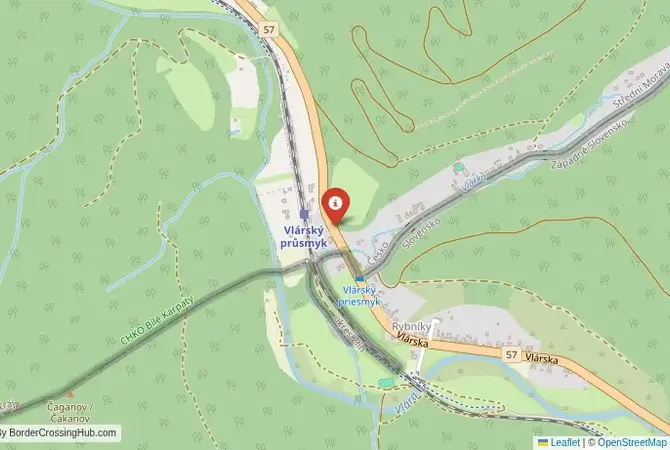
Approximate Border Location
Wait Times
15-60 min for pedestrians/vehicles
Operating Hours
Open 6:00 AM – 10:00 PM
Crossing Types
Pedestrians, vehicles
Border Type
Land crossing via road
Peak Times
Mornings (7-10 AM)
Daily Crossings
~2000 travelers/vehicles
Currency Exchange
Limited near Uherský (EUR, CZK)
Safety Information
Rural, minimal crime
Languages Spoken
Slovak/Czech
Accessibility Features
Ramps, assistance
About Uherský Brod & Vlárský průsmyk
A Historic Mountain Pass Crossing
The border crossing connecting the area near Uherský Brod in the Czech Republic with the Vlárský průsmyk (Vlára Pass) in Slovakia is a journey through a historic and strategic mountain pass. This is a major road and rail crossing that cuts through the White Carpathian Mountains, following the valley of the Vlára River. Since both Slovakia and the Czech Republic are members of the European Union and the Schengen Area, there are no permanent border controls. To cross here is to travel a route that has been a trade and military corridor for centuries, a seamless passage through a landscape of dramatic hills, dense forests, and historic towns.
Operational Details
This checkpoint connects the Zlín Region of the Czech Republic with Slovakia’s Trenčín Region. It is a major regional road and a key railway line, open 24/7. The former border posts are now largely abandoned or repurposed. Traffic flows freely, and the only signs of the border are the standard blue EU signs. The route is important for connecting the Moravian Slovakia region of the Czech Republic with the middle Váh river valley in Slovakia. The railway line is a key link for both passenger and freight traffic, a scenic journey through the mountains.
Before Crossing
Crossing borders gets messy sometimes, think political flare-ups or gates shutting fast. Good travel insurance is a must for handling doctor visits, trip disruptions, or security scares. Don’t get caught unprepared. To find a policy that’s got your back, check out reliable plans today for peace of mind.
A History of the Velvet Divorce
The history of this crossing is the history of Czechoslovakia. For 75 years, this was an internal administrative line. The mountain pass was a boundary between the Slovak and Czech parts of a single country. This changed on January 1, 1993, with the “Velvet Divorce.” The Vlára Pass crossing was instantly transformed into a full-fledged international border. For over a decade, it was a place of passports, customs checks, and queues. This all changed again in 2007 when both countries joined the Schengen Area, and the physical border controls were dismantled overnight, restoring the easy passage that had existed for generations.
The Seamless Border Procedure
Today, there is no border procedure for travelers. You simply drive or take the train through the mountain pass. There are no passport checks and no customs inspections. This is the reality of the Schengen Area. However, it is important to remember that both Czech and Slovak police and customs authorities can and do perform random checks on vehicles and trains anywhere in their territory, including near the former border. You are still required to carry a valid passport or national ID card with you at all times.
The Surrounding Region: Czech Side
On the Czech side, the crossing is in the Moravian Slovakia (Slovácko) ethnographic region. The nearby town of Uherský Brod is famous as the home of the Comenius Museum (dedicated to the great educator John Amos Comenius) and the CZ firearms factory. The region is known for its traditional festivals, particularly the “Ride of the Kings,” a UNESCO-listed cultural phenomenon. The beautiful spa town of Luhačovice, with its unique architecture by Dušan Jurkovič, is also nearby. The area is part of the White Carpathians Protected Landscape Area, known for its unique biodiversity.
The Surrounding Region: Slovakia Side
On the Slovak side, the crossing leads into the middle Váh river valley. The nearest major Slovak town is Dubnica nad Váhom, an industrial center. The city of Trenčín, with its magnificent medieval castle perched on a rock overlooking the river, is a short drive away. The castle has a famous Roman inscription from 179 AD, marking the northernmost presence of the Roman Empire in this part of Europe. The region is a gateway to the beautiful Strážov Mountains, a popular area for hiking.
Practical Travel Information
Practical planning for this route is very simple. The most important thing is to have the required motorway vignettes if your journey involves motorways in either country. Both Slovakia and the Czech Republic use an electronic vignette system (`elektronická diaľničná známka`), which must be purchased online in advance. The official currencies are the Czech Koruna (CZK) in the Czech Republic and the Euro (EUR) in Slovakia. Services are available in the towns on both sides of the border. The mountain roads can be challenging in winter, so it is important to have appropriate tires and to check the weather conditions.
Final Considerations
The Vlárský průsmyk border crossing is a scenic and historically significant route through the heart of the White Carpathians. The abandoned checkpoint buildings are a reminder of a divided past, while the free-flowing traffic is a celebration of the present. It offers a beautiful journey through a region rich in nature, history, and folklore. It is a border that you might not even notice you have crossed, a testament to the success of the Schengen project in this stunning mountain landscape.
No reviews yet.
